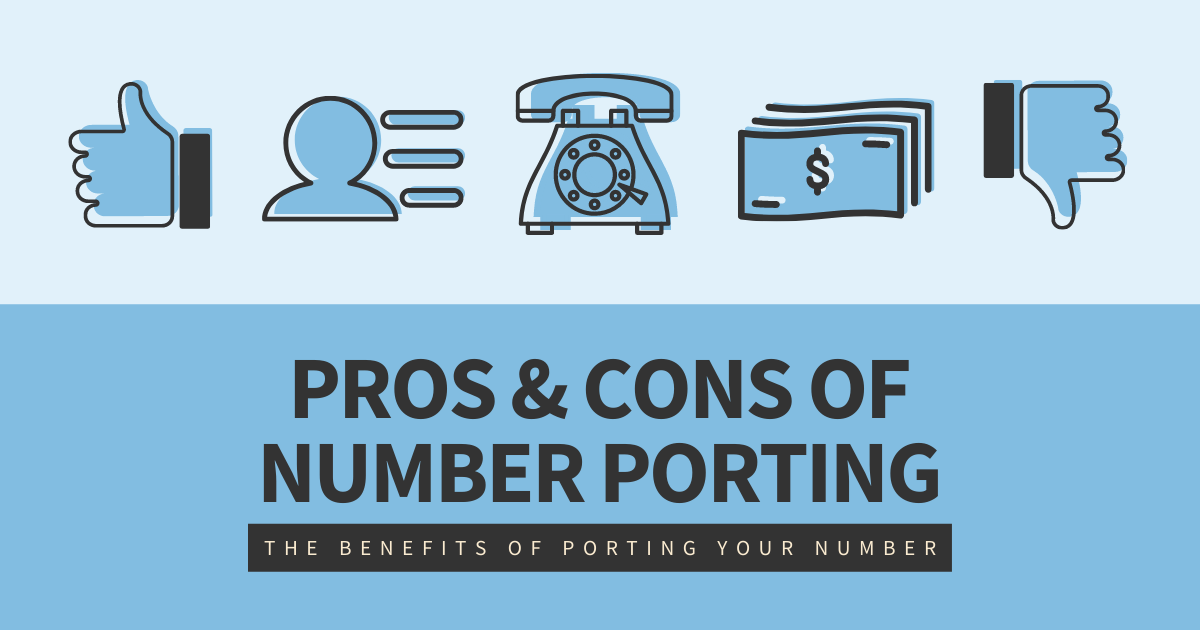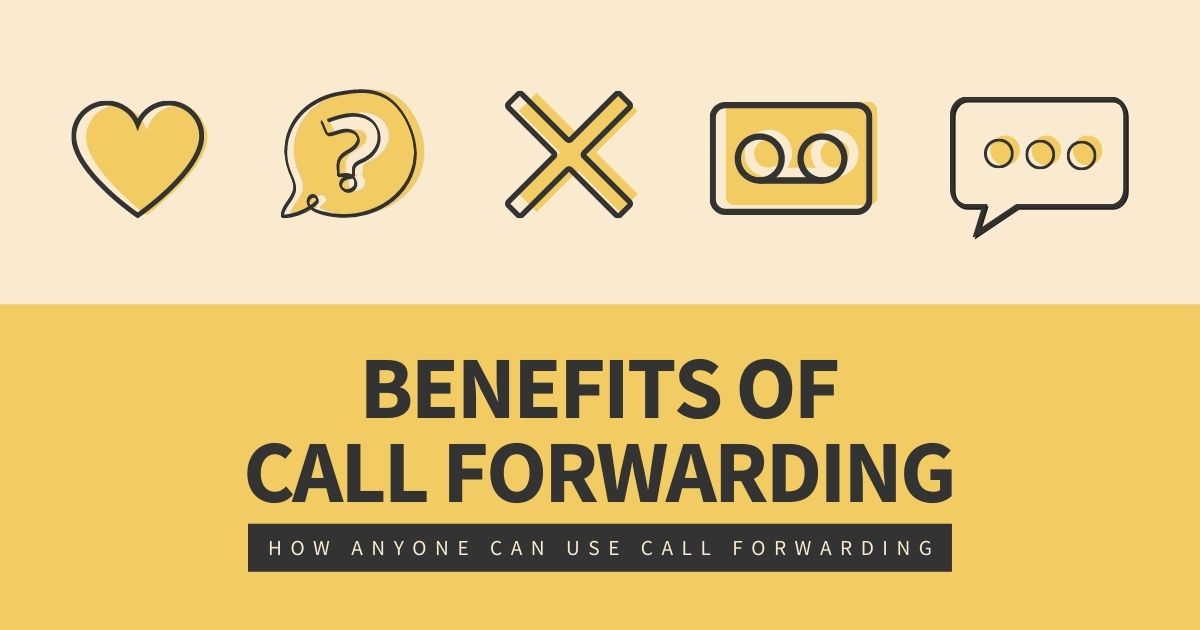The Benefits You Get When You Port Your Phone Number
Number Porting is one of those obscure things you don’t know exists until you absolutely need it. You might even be asking yourself, “Yeah, wait a second, what does ‘porting your phone number’ even mean? Am I shipping it out to sea?”
If that’s the case, you’re not alone. There are a lot of people in the same boat (pun intended).
Having been on that boat, I’m now here, writing this post about number porting, to tell you how amazing and useful it is… and how it can possibly save you from having your identity stolen.
Yes, it’s that serious.
While I believe everyone should know porting is an option, I also believe everyone should know the upsides and downsides to it so they know what to expect. Depending on your priorities, the cons may tell you that porting isn’t your best option, though we can assure you the pros heavily outweigh the cons.
Our goal for this post is to help you make a confident and fully-informed decision that’s right for your phone number needs. Let’s start with defining number porting.
What is Number Porting?
Porting your number means transferring your phone number from one service provider to a different service provider.
For example, let’s say your phone number is with NumberBarn (that’s us!), but you want to switch to Bumber-Narn (totally legit company).
You will have to port, or transfer, your active number from NumberBarn to Bumber-Narn. Once that number is no longer with NumberBarn, you’ll no longer pay us for service. Instead, you’ll pay Bumber-Narn once it ports away.
Same number, different provider. I’m sure you can already see how that in itself is a huge perk.
Simple enough, right? It may be simple and have obvious perks on the surface, but there are more aspects and benefits to porting than you may initially think.
Let’s dive into those benefits.
The “Good” of Number Porting
You Get to Keep Your Phone Number
We’ll start with the easiest “pro,” which we already touched on. With porting, you get to keep your number when switching to another provider.
Your current situation may require that you switch service providers, even if you don’t want to. Luckily, that doesn’t mean you have to say goodbye to the phone number you’ve had your whole life.
Thank goodness!
Imagine having to change your phone number with your bank, your doctor, DoorDash, Uber, social media, etc.
You get to avoid all that hassle and keep your phone number along with your time and sanity.
You Can Keep Your Landline
Now, you might be thinking, “isn’t this the same as keeping your number?” and you wouldn’t be wrong, technically. But, it’s worth differentiating since landline numbers work differently than your cell phone number.
Most people just assume that when you move to a new house, you have to get a new number – one that comes with that house.
That isn’t the case. That number is yours, not the house’s.
If that’s the boat you’re in, it’s more than likely you’ve had that number for years.
The good news is, you have the option of keeping that number and porting it to the carrier at your new residence.
If the number isn’t supported by the rate center, you have another option. You can port your number to NumberBarn and forward your calls to your new landline.
Save Some Money
In the latter case of porting your number to us, that option can actually save you a lot of money.
As we all know, landlines are becoming obsolete and going extinct. If your only reason for having a landline is that you don’t want to lose your phone number, then I have good news.
You can both cancel your landline and keep your number. That’s what’s known as a “win-win.”
When you keep your number and port and park with us, you only pay $2 a month. No, that’s not a typo.
Landlines, on the other hand, can cost you anywhere from $10 to $35 a month. Now do the math. You’re saving $8 to $33 a month by saving your number and storing it with NumberBarn.
That’s what’s known as a “win-win-win.”
Choose Your Own Phone Number
If you’re indifferent about keeping your number, there’s still a ‘pro’ that you’ll probably enjoy.
You can choose your own phone number, regardless of whether you need a new landline or a new cell phone.
Usually, the carrier that belongs to your new device will just assign you a number, but you don’t have to stick with that number.
Before switching carriers or getting a new device, just do a quick phone number search and find a number that you like. You could get an unforgettable vanity phone number and help your friends and family remember your number by including your name in it, or a favorite word, like BARN. Once you find the number of your dreams, you can port it out to your new provider.
However, even if you want a new primary number, I’d suggest holding on to the one you have now. Why?
To protect your identity.

Protect Yourself From Identity Theft
The final “pro” we’ll go over is probably the most important one.
Choosing to port your number, as opposed to losing it and receiving a new one, can protect you from identity theft.
Normally, when you get a new phone number, your old one gets recycled. Once your number gets recycled, you become more susceptible to a number of different cyber-attacks, as found by Princeton University.
They discovered that one of the ways attackers gain access to your private information is by “cycling through available numbers and checking if any of them are linked to existing online accounts (e.g., social media, email, e-commerce). Attackers obtain the numbers with hits and try to reset the password on the linked accounts via SMS-based password recovery.”
You can then guess what they’re able to do once they gain access to those accounts.
In this example, the obvious solution is to make sure you remove your number from all existing online accounts. And that’s fair, but definitely not an easy feat.
Not to mention that’s only one of eight threats presented by number recycling. Scary stuff.
To help protect yourself from those attacks, port your old phone number and park it. Parking doesn’t just prevent others from using your number, but it prevents cyberattacks by keeping your number off that list of available numbers.
Convinced yet?
The “Not-So-Good” of Number Porting
All Numbers are Not Supported By All Providers
It’s a bit of a bummer, especially if you found a killer deal with another, cheaper provider, but your beloved phone number may not be supported by your new service provider.
There are various reasons why a provider isn’t able to accept your number, but the most common reason is because of the rate center. (Feel free to read our blog post on rate centers for more info on what they do.)
Before porting your number, check with your new provider if they can take your number. If you’re not able to, not all hope is lost.
You can port your number to NumberBarn and set your account to forward all calls to your new number. Note the bolded “calls”.
Texts won’t be forwarded to your device, but you can text through your NumberBarn account or the NumberBarn app.
The Process May Take a While
The process of porting your phone number can take anywhere from 3-10 business days.
“Woah! Why such a wide range?”
Great question, glad you asked! It entirely depends on what type of phone number you have: is it a wireless number or a wireline number? Are you porting your number to a wireless or a wireline provider?
“I still have no idea what you mean…”
Yea, I don’t blame you.
Basically, if you’re currently with a mobile provider (like AT&T or Verizon), your number is a wireless number. If you have a landline with a residential phone service provider (like Cox or Spectrum) or a VoIP provider (like NumberBarn or Nextiva), your number is a wireline number.
Switching from wireless to wireline (or vice versa) is when the porting process can take 3-10 business days. If your number is wireless and you’re switching to another wireless provider, it can take a matter of seconds. (Normal seconds, not business seconds.)
“Okay, got it. But I’m in a pinch and need to know exactly how many days it will take.”
Totally understand, but there’s no saying for certain. It depends on your new carrier. Each carrier processes its porting requests at different times and at different speeds.
The good news is that there should be no interruption to your phone service during the porting process. Numbers have to remain active during the porting process for it to complete, so your phone service will remain usable during the entire porting process.
Pro Tip: When you are porting away from NumberBarn, NumberBarn will cancel service after porting is complete so you don’t have to worry about any accidental future charges from NumberBarn. If you’re porting into NumberBarn, you do need to cancel with your previous service provider after you’ve completed your port.
Taking Too Long?
Do you feel that your port is taking longer than usual? Make sure you’re not guilty of any of these porting crimes. (Okay, they’re not actual crimes. Just reasons on your end that may have delayed your port.)
If you’re completely innocent, reach out to the new carrier that’s receiving your number since the delay may be on their end.
We’d also recommend reaching out to the new carrier before requesting your port to ask what the timeline may look like.
Time to Weigh Your Pros & Cons
Now that we’ve gone through the most important points of the pros and cons of number porting, jot down what stands out to you.
Do the pros outweigh the cons? Or the other way around?
Our assumption is the former, but you know what they say about assumptions…
In our experience, you’re better off porting your number 99% of the time. Even if your new provider can’t take your number, porting to a VoIP provider, like NumberBarn, and forwarding your calls to your new number can prevent all kinds of headaches in the future.
If that’s the case, check if we at NumberBarn can take your number.
Once you check, start the process of porting it today and park it with us for as long as you need to for only $2/month.
It’s best to hold onto that number. You never know when you might need it!

